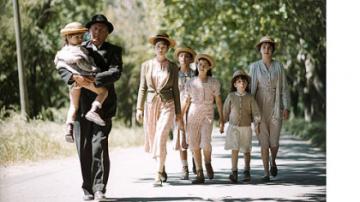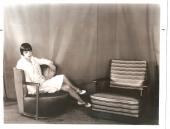'Well-Digger's Daughter': lovely French remake of a lovely Pagnol original
At its emotional and visual best, film can sweep us away, on the wings of a strong story and characters, to a time and place wondrously different from our own.
No stories and characters are stronger than those of Marcel Pagnol, whose novels were turned into the gorgeous diptych of "Jean de Florette" and "Manon of the Spring" (1986). Those films co-starred Daniel Auteuil, who has turned himself into a deft actor-director with "The Well-Digger's Daughter," a lovely remake of Pagnol's 1941 original.
We and well-digger Pascal (Mr. Auteuil) are in the quaint Provence village of Salon on the eve of World War I. Pascal is the widower-father of six daughters, of whom 18-year-old Patricia (Astrid Berges-Frisbey), educated in Paris, is the most luminously beautiful and virtuous. Pascal would like her to marry his faithful old friend and partner, Felipe (Kad Merad), but her pulse is far more quickened by handsome aviator Jacques (Nicolas Duvauchelle), a dashing young cad who abandons her to the consequences of their one-day affair.
Jacques' rich pusillanimous parents reject her. So does her father. Torn between his wounded honor and his deep love for her, Pascal banishes Patricia to the distant village care of a sister, where her misery is complete with the news that Jacques has been killed in action.
Might there now be any chance for dear old Felipe -- also gone to war -- if and when he returns? Don't rule it out, but don't count on it.
Pagnol's own film version of his story, which starred Fernandel and Josette Day, was an equally touching but much more comedic rendering. As a writer, he was a kind of Thomas Hardy in reverse: All lovers are ill-fated up to, but not including, the end. Mr. Auteuil's faithful adaptation is more concerned with the poignancy of the tale -- its semi-tragic clash of love and class -- and with the pictorial beauty of the setting. Like his Provencal characters, he seems in no big hurry to go anywhere, preferring to savor -- or console them and himself with -- southern France's most picturesque landscapes. The dollyback reverse-zoom shots are to die for.
It's the actors' performances that elevate and energize the thing, starting with his own. Mr. Auteuil's ever-so-restrained Pascal is a Gallic Spencer Tracy, full of nobility and benevolence in equal measure. The painful honesty of his scenes with Mr. Merad as sweet, patient Felipe hit the mark perfectly. Ms. Berges-Frisbey's Patricia is wrenchingly soulful, vulnerable and convincing. Her store-owner would-be in-laws (Jean-Pierre Darroussin and Sabine Azema as Jacques' parents) are the maddening epitome of haute bourgeois superficiality. As Pascal says of them: "It's wise to be wary of people who sell tools but never use them."
The impact of "Well-Digger's Daughter" is much heightened by its music, not only one of film-composer Andre Desplat's finest scores, but also a lushly re-orchestrated Caruso recording of "Core 'Ngrato" (Ungrateful Heart), an exquisite Cardillo-Cordiferro song: "Once I gave you myself ... Ungrateful heart, you wrenched my life from me and now you no longer think of me!" It's new to me, and I bet to you, too. Find it (or the Pavarotti and Bocelli versions of it) on YouTube.
It just occurs to me that in 2,000 film reviews since the Coolidge administration or thereabouts, I have never once singled out a subtitle writer for recognition. Talk about an unsung art; we only notice it when it's done badly. Let us now praise, and credit by name, the superb translation skills here of subtitler Ian Burley.
Ultimately, this "Daughter's" old-fashioned, melodramatic sweetness comes dangerously close to toothache. But its characters are so endearing and involving, and its performances so honest and real, that I bet you'll forgive the sentimental excess.






